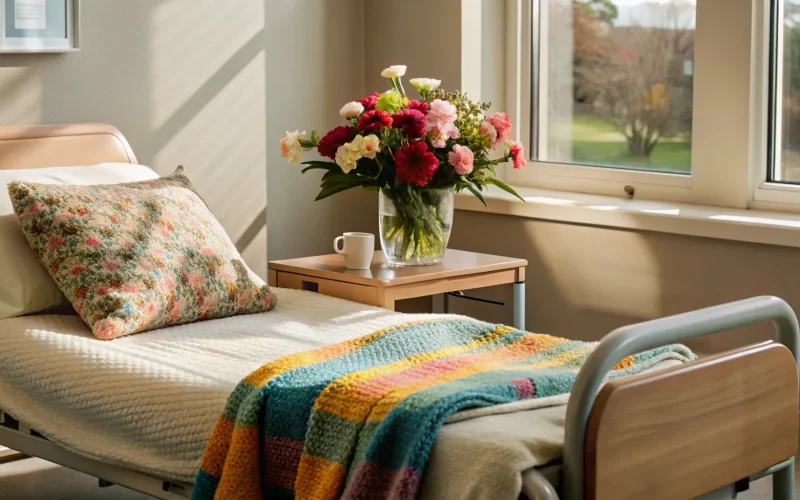Being a caregiver means wearing many hats—nurse, friend, advocate—all while juggling your personal life. It's a role that demands resilience and patience. But what happens when you forget to care for yourself? Ignoring your own needs can lead to burnout and health issues that benefit no one. Here’s why taking care of yourself should be at the top of your list.
Key Takeaways
- Prioritize Self-Care: Caregiving is demanding and can lead to burnout if personal health is neglected. Regular medical check-ups and medication adherence are essential.
- Recognize the Signs of Overwhelm: Be vigilant about physical and emotional indicators of stress. Early recognition can prevent serious health issues and improve caregiving effectiveness.
- Build a Support Network: Lean on family, friends, and professional support to share responsibilities and reduce stress. Open communication with loved ones and healthcare providers is crucial for maintaining well-being.
The Importance of Self-Care for Caregivers
Caregiving is a labor of love, but it's also a job that comes with its own set of challenges. Balancing the needs of those you care for with your own can be daunting. Yet, prioritizing self-care is crucial not just for your well-being but also for the quality of care you provide. Ignoring self-care can lead to significant health issues that affect both the caregiver and those they support.
Understanding Caregiver Stress
Caregiver stress is a real phenomenon with tangible effects on mental and physical health. The constant demands and emotional toll can lead to exhaustion, anxiety, and depression. According to the National Council on Aging, prolonged stress can exacerbate existing health conditions and even lead to new ones, such as high blood pressure or heart disease. This stress doesn't just impact caregivers; it ripples out to affect family dynamics and financial stability.
Consequences of Neglecting Self-Care
Neglecting self-care can have dire consequences, as highlighted by a Reddit post from a caregiver who experienced serious health issues due to neglecting their own needs. This individual ended up with dangerously high blood sugar levels and blood clots because they forgot to take their medications amidst caregiving duties. Such examples underscore the importance of maintaining personal health routines even when caregiving responsibilities feel overwhelming.
Recognizing the Signs You Need a Break
It's vital for caregivers to recognize when they're reaching their limits. Ignoring these signs can lead to burnout, which makes caregiving unsustainable in the long run.
Physical and Emotional Indicators
Common signs that you might need a break include persistent fatigue, irritability, anxiety, changes in appetite or sleep patterns, and feelings of being overwhelmed or trapped by your caregiving duties. According to Senior Care Access, physical symptoms like lethargy or feeling physically exhausted are clear indicators that it's time for some rest.
The Importance of Early Recognition
Recognizing these signs early can prevent more serious health issues down the line. Addressing stressors promptly helps maintain both your well-being and your ability to provide effective care. By being proactive about self-care, you ensure you're able to continue supporting your loved ones without compromising your own health.
Practical Self-Care Tips for Caregivers
Incorporating self-care into daily routines might seem challenging amidst busy schedules, but it's essential for long-term sustainability in caregiving roles.
Prioritize Your Health
Regular medical check-ups are non-negotiable. As seen in the Reddit example mentioned earlier, medication adherence is crucial—forgetting doses can have severe consequences. Make it a habit to schedule regular check-ins with healthcare providers and keep track of any treatments you're undergoing.
Set Boundaries
Setting boundaries is vital in managing stress levels effectively. Clearly define what tasks you are comfortable handling alone and which require assistance from others—whether family members or professional help—as suggested by Mayo Clinic.
Find Time for Yourself
Carving out personal time doesn't have to be complicated; small acts like taking short walks outside or practicing mindfulness exercises daily can make a big difference over time according to Harvard Health. Remember: taking care of yourself isn't selfish; it’s necessary so that you remain healthy enough both mentally & physically capable enough take care someone else!
Building a Support Network
Being a caregiver can often feel like you're carrying the weight of the world on your shoulders. It's demanding, both emotionally and physically. However, you don't have to do it all alone. Building a support network can be your lifeline, providing much-needed relief and companionship in this challenging journey.
Family and Friends
Family and friends play an invaluable role in providing both emotional and practical support to caregivers. They can offer a listening ear when you need to vent or share your feelings, helping to lighten the emotional burden that often comes with caregiving. Moreover, they can step in to assist with tasks like running errands or preparing meals, giving you some respite.
Having open conversations about your needs and limits is crucial. Let your family know how they can help. Sometimes people want to assist but aren't sure how to offer support effectively. By clearly communicating what you need, whether it's an hour of free time or someone else taking over for a weekend, you empower them to be part of your caregiving team.
Professional Support
In addition to leaning on family and friends, seeking professional support can greatly benefit caregivers. Professional counseling provides a safe space for you to express emotions and work through any stress or anxiety that may arise from caregiving duties. Therapists specialize in helping individuals manage stress and develop coping strategies tailored specifically for their situation.
Support groups are another excellent resource for caregivers as highlighted by Caregiver Relief. These groups connect you with others who understand exactly what you're going through because they've been there themselves. Sharing experiences with fellow caregivers not only offers comfort but also practical advice from those who have faced similar challenges.
Encouraging Open Communication
Communication is key in ensuring that caregivers receive the help they need while also maintaining healthy relationships with those around them.
Talking to Family Members
When it comes to family members, being upfront about your challenges is important. Discuss openly about what you're experiencing as a caregiver—both the highs and the lows—and express how their involvement could make a difference. Having regular family meetings where everyone checks in can keep communication lines open and ensure everyone feels heard.
Engaging with Healthcare Providers
Your healthcare providers are not just there for the person you're caring for—they're there for you too. Keep them informed about any health concerns or stressors affecting your ability to provide care effectively as suggested by NIH. They may offer solutions such as adjusting medications or suggesting new therapies that could alleviate some of the burdens you're facing.
Taking Action: Your Health Matters
As a caregiver, it's easy to put someone else's needs before your own; however, prioritizing your health is essential not only for yourself but also for those relying on you.
Start by scheduling regular check-ups with your doctor—consider these appointments non-negotiable parts of maintaining good health practices as emphasized by HelpGuide. Make sure all prescribed medications are taken consistently; neglecting this aspect could lead directly back into crises like those mentioned earlier from real-life experiences shared online.
Additionally, carve out small pockets during each day dedicated solely towards self-care activities: reading books unrelated entirely from responsibilities at hand; enjoying walks around neighborhood parks without distractions present nearby (leave phones behind!); practicing mindfulness exercises proven effective against anxiety/depression symptoms commonly seen among long-term caretakers worldwide today!
Remember: taking care means making conscious choices aimed specifically toward preserving personal wellness over time rather than sacrificing everything else along way simply because others depend heavily upon us now more than ever before perhaps…
Embracing Self-Care as a Caregiver
In the demanding world of caregiving, it's easy to lose sight of your own needs. However, embracing self-care is not just an act of kindness toward yourself—it's a necessity for sustaining your ability to care for others effectively. By recognizing the signs of stress early and taking proactive steps to maintain your health, you not only safeguard your well-being but also enhance the quality of care you provide.
Remember, you're not alone in this journey. Lean on your support network—whether family, friends, or professionals—and keep communication open with those around you. Prioritizing self-care doesn't mean you're neglecting your responsibilities; it means you're ensuring that you can meet them more effectively.
Ultimately, taking care of yourself is one of the most compassionate things you can do for both yourself and those who depend on you. Make self-care a non-negotiable part of your routine, and you'll find that both you and your loved ones will benefit immensely from this balanced approach. Your health truly matters—it’s the foundation upon which all caregiving efforts stand.
Related Articles
- Caring for Someone with Testicular Cancer: Managing Emotional Overwhelm
- A Source of Strength Amid the Struggle: Lexee Carey’s Caregiver Story
- Staying Mentally Strong During Testicular Cancer Treatment
- The Importance of Involving Family Members in Testicular Cancer Diagnosis
- Understanding Cancerversary: A Guide for Survivors
Frequently Asked Questions
Why is self-care so important for caregivers?
Self-care is crucial for caregivers because it helps maintain their physical and mental health, allowing them to provide better care. Ignoring self-care can lead to burnout and health issues, which ultimately affects both the caregiver and the person they are caring for.
What are some signs that a caregiver might need a break?
Caregivers should watch out for persistent fatigue, irritability, anxiety, changes in appetite or sleep patterns, and feelings of being overwhelmed. Recognizing these signs early can prevent more serious health problems.
How can caregivers incorporate self-care into their busy schedules?
Caregivers can prioritize self-care by scheduling regular medical check-ups, adhering to medication routines, setting clear boundaries with caregiving tasks, and carving out personal time. Simple activities like short walks or mindfulness exercises can make a significant difference.
What role does a support network play in caregiving?
A support network provides emotional and practical assistance, helping to share the responsibilities of caregiving. Family and friends can offer relief by taking on tasks or simply listening. Professional support such as counseling or support groups connects caregivers with others who understand their challenges.
How should caregivers communicate their needs effectively?
Open communication is key. Caregivers should discuss their challenges with family members openly and engage healthcare providers about any stressors affecting their ability to provide care. Regular family meetings and keeping healthcare professionals informed ensure everyone understands the caregiver's needs.





